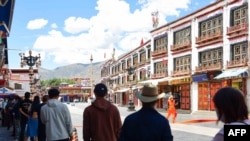Here's a summary of Uyghur-related news around the world.
Xinjiang, Tibet still divided into COVID lockdown zones
China is keeping Xinjiang and Tibet in lockdown zones after fresh COVID-19 outbreaks emerged in the two autonomous regions where Beijing has been accused of gross human rights violations.
Chinese ambassador to New Zealand denies Uyghur rights abuses
Wang Xiaolong, China's ambassador in New Zealand, dismissed findings by the U.N.'s special rapporteur on modern slavery as "smear tactics" against China. The rapporteur found that Uyghurs subject to forced labor face "excessive surveillance," substandard living and working conditions, internment, threats, physical and sexual abuse, and "other inhuman or degrading treatment."
U.N. rights chief's promised report on Xinjiang still not ready
Michelle Bachelet, the U.N. high commissioner for human rights, told reporters Thursday that her office was still trying to complete its report on human rights in Xinjiang, suggesting that it would not be released before she steps down from her position August 31. She said in June that the report would be released before she left office.
Uyghur man in Australia tells his family's story of separation, reunion
Sadam Abdusalam, a Uyghur man living in Australia, has written a book called "Freeing My Family," a story about how Beijing's policies against Uyghur Muslims separated him from his wife for 3½ years, causing him to miss the birth of his son.
Chinese Australian journalist says she was targeted for speaking out on Uyghurs
Vicky Xu, a Chinese Australian researcher and journalist, says she was targeted, harassed and intimidated by the Chinese government and its supporters in Australia for her research and report on Uyghur forced labor in China.
In brief
The U.S. government accused China of manipulating global discourse on human rights in Xinjiang, a move Uyghur activists welcomed as timely. They say they have become the target of China's disinformation campaign for many years and urge the U.S. to support their organizations to counter misinformation from China.
Quote of note
"PRC [People's Republic of China] messaging tactics seek to drown out critical narratives by both flooding the international information environment to limit access to content that contradicts Beijing's official line, and by creating an artificial appearance of support for PRC policies. Messengers use sophisticated AI-generated [artificial intelligence-generated] images to create the appearance of authenticity of fake user profiles." — The U.S. State Department, "PRC Efforts to Manipulate Global Public Opinion on Xinjiang," August 24, 2022.






